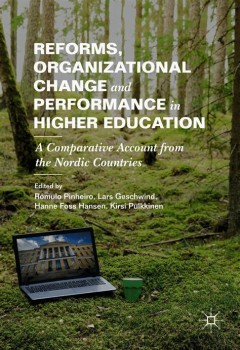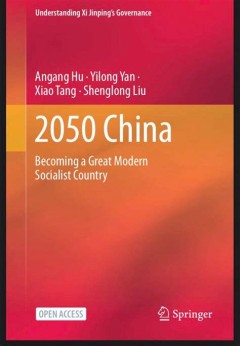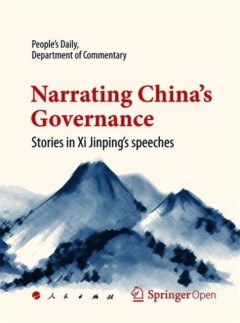Filter by

Reforms, Organizational Change and Performance in Higher Education = A Compar…
This open access book investigates the effects of changes in leadership and managerial structures of Nordic universities resulting from reforms in the last decade. It builds on a rich, comparative dataset across a multiplicity of system-wide (macro) and organisational (meso and micro) dimensions, namely: reform or policy initiatives; drivers, aims, instruments and actors; structural changes wit…
- Edition
- 1
- ISBN/ISSN
- 9783030117382
- Collation
- XX, 326 ill; lamp
- Series Title
- -
- Call Number
- -

2050 China = Becoming a Great Modern Socialist Country
This book is arranged and developed around the theme of “2050 China,” it analyzes the factors and advantages of the Chinese road to socialist modernization, explores and summarizes the development goal and the basic logic of the socialist modernization of China, and further shows the general basis of the primary stage of socialism. According to the report delivered at the 19th Party Congres…
- Edition
- 1
- ISBN/ISSN
- 9789811598333
- Collation
- VI, 105 hlm; ill., lamp.,
- Series Title
- -
- Call Number
- -

Narrating China's Governance
This open access book captures and elaborates on the skill of storytelling as one of the distinct leadership features of Xi Jinping, the General Secretary of the Communist Party of China and the President of the People’s Republic of China. It gathers the stories included in Xi’s speeches on various occasions, where they conveyed the essence of China’s history and culture, its reform and d…
- Edition
- 1
- ISBN/ISSN
- 9789813291782
- Collation
- XXV, 266 hlm; ill., lamp.,
- Series Title
- -
- Call Number
- -

Your Post has been Removed : Tech Giants and Freedom of Speech
This open access monograph argues established democratic norms for freedom of expression should be implemented on the internet. Moderating policies of tech companies as Facebook, Twitter and Google have resulted in posts being removed on an industrial scale. While this moderation is often encouraged by governments - on the pretext that terrorism, bullying, pornography, “hate speech” and “…
- Edition
- 1
- ISBN/ISSN
- 9783030259686
- Collation
- XVIII, 287 hlm; ill., lamp.,
- Series Title
- -
- Call Number
- -

A City in Blue and Green The Singapore Story
This open access book highlights Singapore’s development into a city in which water and greenery, along with associated environmental, technical, social and political aspects have been harnessed and cultivated into a liveable sustainable way of life. It is also a story about a unique and thoroughgoing approach to large-scale and potentially transferable water sustainability, within largely ur…
- Edition
- 1
- ISBN/ISSN
- 9789811395970
- Collation
- X, 152 hlm; ill., lamp.,
- Series Title
- -
- Call Number
- -

Democratizing Risk Governance
This open access book features contributions from a multidisciplinary team of leading and emerging scholars focused on democratization of risk assessment, management, and communication. The volume identifies and sheds light on key risk governance dilemmas related to public trust, risk perception and public participation. The first part of the book articulates the relationship among science, exp…
- Edition
- -
- ISBN/ISSN
- 978-3-031-24271-7
- Collation
- XVIII, 421
- Series Title
- -
- Call Number
- -

Sustainable Enterprise Value Creation
This Open Access book provides a practical guide to the creation of sustainable enterprise value and implementation of the principles of stakeholder capitalism for corporate boards and management teams. The authors argue that business leadership is on the threshold of a new era driven by major shifts in technology, society, political economy and climate change. They set this transition in inter…
- Edition
- 1
- ISBN/ISSN
- 978-3-030-93560-3
- Collation
- -
- Series Title
- -
- Call Number
- XVII, 289

Nachhaltige Gestaltung von lokalen Ernährungssystemen durch Kommunalpolitik …
Dieses Open Access Buch erarbeitet konkrete Ansatzpunkte, wie die kommunale Praxis in Politik und Verwaltung Beiträge zur Ernährungswende Richtung Nachhaltigkeit leisten kann. Dabei wird u.a. aufgezeigt, dass die Aufgaben von Städten und Gemeinden, beispielsweise bei der öffentlichen Beschaffung, in Planungsfragen oder bei der Wirtschaftsförderung, bereits weit in ernährungsrelevante Bere…
- Edition
- -
- ISBN/ISSN
- 978-3-658-42720-7
- Collation
- XV, 123
- Series Title
- Stadtforschung aktuell (STADT)
- Call Number
- -

Ehrenamtliche Bürgermeister in Deutschland : Das unbekannte Wesen
Dieses open access Buch enthält als erste politikwissenschaftliche Publikation Daten zu ehrenamtlichen Bürgermeistern für alle 10 Bundesländer, in denen diese eine wichtige Position der politischen Repräsentation in ländlichen Räumen einnehmen. Etwa 60% aller Kommunen in Deutschland werden von ehrenamtlichen Bürgermeistern verwaltet, deren regionale Bedeutung sich je nach Bundesland abe…
- Edition
- -
- ISBN/ISSN
- 978-3-658-43894-4
- Collation
- XVI, 117
- Series Title
- Stadtforschung aktuell (STADT)
- Call Number
- -

Datenreport Zivilgesellschaft
Als Open Access Publikation bietet der Datenreport Zivilgesellschaft erstmals einen Überblick über Stand und Entwicklung von Zivilgesellschaft und bürgerschaftlichem Engagement in Deutschland auf verbindender Grundlage der ganzen Bandbreite vorliegender Erhebungsdaten. Aus der Verbindung der Erhebungen entsteht eine einmalige datenbasierte Gesamtschau, die sich an Zivilgesellschaft, Politik…
- Edition
- -
- ISBN/ISSN
- 978-3-658-22958-0
- Collation
- XXIII, 176
- Series Title
- Bürgergesellschaft und Demokratie (BÜD)
- Call Number
- -
 Computer Science, Information & General Works
Computer Science, Information & General Works  Philosophy & Psychology
Philosophy & Psychology  Religion
Religion  Social Sciences
Social Sciences  Language
Language  Pure Science
Pure Science  Applied Sciences
Applied Sciences  Art & Recreation
Art & Recreation  Literature
Literature  History & Geography
History & Geography